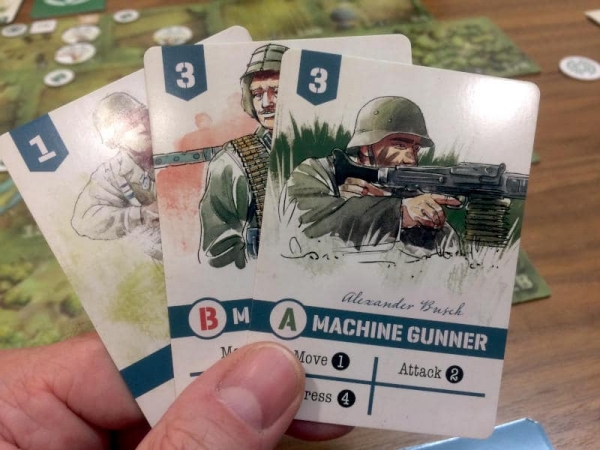Card games date back to the 1400s with Karniffel, or Thuringian Karnöffel, often listed as the oldest one, at least the oldest in Europe that we know of. As a popular trick-taking game in Germany for centuries, it clearly started a trend. Many trick-taking games are still popular in Germany today and I certainly grew up with a fair few. However, card games have come a long way since then. In this article, I want to look at deck-building games specifically and how this mechanism has been applied in many different ways since Dominion made it popular.
The Basics
I probably don't need to explain it, but deck-building is a mechanism where players select cards in some way to add to their hand, discard pile or draw deck. The aim is to make their overall collection of cards more likely to let the player win the game. Sometimes players start with a random set of cards or maybe a pre-built deck that they then change during the game.
As far as I know, deck-building games didn't originally allow for cards to be removed. The idea of thinning your deck to make it more efficient by removing less useful cards was introduced later on. Mind you, the German trick-taking game Skat does have a similar concept. After dealing everyone their hand, two cards are placed in the middle face-down. The winner of the subsequent bidding phase then takes those two cards and may use one or both to replace them with cards from their hand. It's not quite thinning, but it's close.
Anyway, the idea of trashing your cards during a deck-building game is now a relatively common facet of this mechanism. In fact, it's often a key element that players should take advantage of. Deck-building games are usually designed in such a way that players start with less powerful cards. Adding better cards does make the deck better, but the less powerful ones still slow things down. So shedding these cards during the game makes players' decks more powerful overall.
Deck-Building Over Time
Deck-building games used to simulate some sort of combat, usually between only two players. The decks of cards would consist of attack cards, healing cards and money cards. As you would expect, attack cards reduce an opponent's health, healing cards allow you to increase your own health and money cards are used to buy better cards, often from a publicly visible and shared offer row. Players would play cards out in front of them and use them appropriately, then discard them all. They would redraw their hand from the draw deck and when that ran out, they would shuffle their discard pile into a new draw deck.
Of course, games started to introduce other types of cards to create some variety and renewed interest. For example, magic or energy that you could use to cast spells introduced a new type of resource you needed to manage. Ultimately though, everything was about inflicting damage on your opponent, protecting yourself from attack with shields to reduce the damage, healing yourself or buying new cards.
Shards of Infinity introduced the concept of being able to play some cards immediately after buying them, but then having to take them out of the game. I think that's quite clever, because it means you can gain an effect straight away, while not adding to your deck and therefore keeping it nice and thin.
Mystic Vale changed the building element in such a way that your deck would never get bigger, but instead, the cards would get more powerful. You're basically buying upgrades to your cards, rather than adding to your deck with cards. Also, rather than attacking your opponents, Mystic Vale is a race game where you want to get the biggest share of a pool of points.
 Mystic Vale
Mystic Vale
Deck-Building With a Difference
It didn't take long for the mechanism to be applied in very different ways than what I have talked about so far.
I guess one of my most popular ways of using deck-building is in the Undaunted series of games. When I started to play Undaunted: Normandy with a friend, I was expecting a war game where your cards represented commands to move pieces around the map and attack your opponent. However, I didn't expect the game to be so much of a deck-building game in the classic sense. Other than having to learn the actions on offer, the game felt immediately familiar. You draw cards, play cards, draw up again, shuffle discards into draw decks and everything else.
All right, instead of a shared offer row, you have your own supply of cards. Instead of having money cards, you have the bolster action. Cards are also multi-functional, allowing you to choose one action of three or four from each card. However, everything else is very much like a classic deck-building game. At the same time, you're playing a war game on a map with cardboard tokens and dice. It's unexpected, but works absolutely beautifully.
 Undaunted: Normandy Cards with Names
Undaunted: Normandy Cards with Names
Fort is definitely a deck-building game, but it changes where players can buy cards from. There is a shared offer row, but any cards a player didn't use on their turn are also available for others to buy. The idea is that cards are children that you have invited over to your place. The cards that you play represent the kids you decided to play with. The cards you didn't play are those that you ignored and didn't include in the group. They hang around in your yard, waiting for a nicer kid to invite them over and play with them.
Deck-Building With Depth
The latest deck-building game I have played is Imperium: Classics. I think this game takes the mechanism to another level. Every player takes on the role of a faction, such as the Romans or Vikings, represented by a unique deck of cards. Every faction has different powers and plays in a different way, making the game asymmetric. While most factions want to become empires and score the most points, for some factions, their best strategy is different. They want to end the game early by forcing the other players to take the most Unrest cards.
There is still a shared market of cards and players can play cards in front of them, like you will have seen in other deck-building games. There is also the usual drawing up to your hand size, discarding cards and shuffling your discard into a new draw deck. However, there are lots of little extra twists and changes that create so much extra interest.
Even though you're not replaying history, the essence of the faction you're playing does come through. It's obviously highly abstracted and probably quite stereotyped. Vikings want to pillage, Romans want to build monuments, etc. Yet, it is amazing how much depth there is to this game that's basically just a few decks of cards and some cardboard tokens.
I haven't yet written my review of Imperium: Classics, but let me say this: after playing it twice, my friend bought Imperium: Legends because he liked what he saw so very much. So, watch this space, as they say.
What About You?
I'm sure there are many other deck-building games that introduce new concepts and push the mechanism in different directions. Are there any deck-building games that you enjoyed playing? What did you like about them? What new twists and new takes on this now classic mechanism have you come across? As always, please share your thoughts and experiences in the comments below. I wonder what great deck-building games I might have missed.
 Games
Games How to resolve AdBlock issue?
How to resolve AdBlock issue? 



























